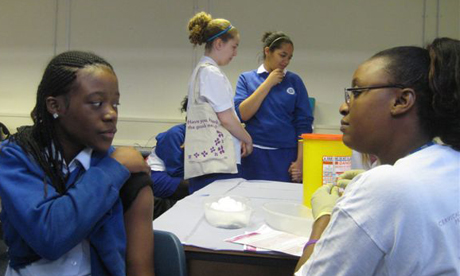Get jabs to prevent cervical cancer, says Hackney NHS

Seated left: Luce Tshibangu; Jesca Gudza, Clinical lead in school nursing (right); Standing left: Casey Nevin, and Eden Yates-Stephenson (right), Haggerston Secondary School
Women and girls in Hackney and the City are being offered the chance of protection from cervical cancer. NHS City and Hackney is supporting European Cervical Cancer Prevention Week by reminding them of the availability and benefits of cervical screening and vaccination.
Cervical cancer is the second most common cancer among women under 35 years old. Every year in the UK, over 2,800 women will be diagnosed with cervical cancer and 1,000 women will die from the disease.
Cervical cancer is almost always caused by Human Papillomavirus (HPV), which is preventable through vaccination.
Dr Jose Figueroa, Deputy Director of Public Health said, “We routinely provide the vaccine through school nurses to girls in Year 8 (aged 12-13). We also offer the vaccine to all girls up to 18 years of age through schools, colleges, and GP practices.”
“Vaccination helps prevent HPV while cervical screening, sometimes called a smear test, can detect early changes in the cervix, which can be treated before they develop into cervical cancer,” he said.
“We also routinely invite women aged 25 to 64 for cervical screening,” he said.
“Women who have not received an invitation or want to make an appointment or just want to speak to somebody about cervical screening should talk to their GP,” he said.
“Girls – or their parents – who want the HPV vaccination or would like more information should speak to their school nurse or GP,” he said.
Information on European Cervical Cancer Prevention week is available on the European Cervical Cancer Association website.
Cervical cancer is almost always caused by Human Papillomavirus (HPV). HPV is a very common virus that is spread by intimate contact with an infected person. Eight out of ten women will catch it at some time in their lives.
It does not present any symptoms so infected people may not know they have it. Most people clear the virus spontaneously, without any treatment.
Cervical screening can also prevent cervical cancer. Cervical screening, sometimes called a smear test, can detect early changes in the cervix, which can be treated before they develop into cervical cancer.
The NHS Cervical Screening programme saves the lives of approximately 4,500 women every year and not going for cervical screening is one of the biggest risk factors for cervical cancer.
NHS City and Hackney runs a HPV vaccination programme for adolescent girls, in line with expert advice and recommendations from the Department of Health. It is estimated that across the UK about 1,000 lives will be saved each year as a result of the vaccination programme.
There are many types of HPV; the vaccine protects against the two types that cause most cases (70%) of cervical cancer. Three doses of the vaccine over a six month period are required to provide best protection and the vaccine needs to be given before women become infected with HPV. It is therefore important that girls are immunised early, ideally before they become sexually active.
More information on the vaccine can be found on the NHS immunisation website.
More information on cervical screening can be found here.
